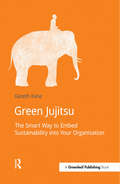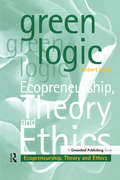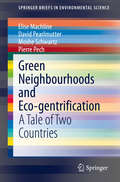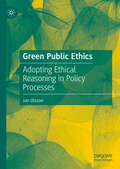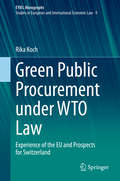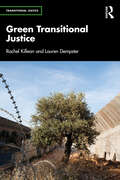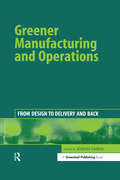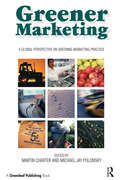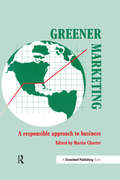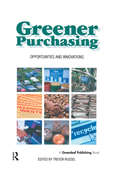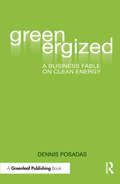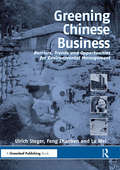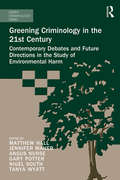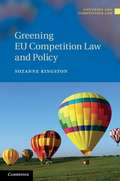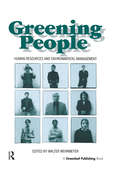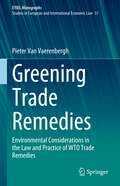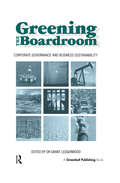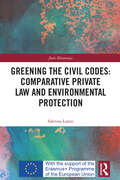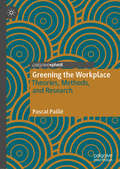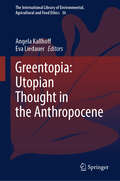- Table View
- List View
Green Jujitsu: The Smart Way to Embed Sustainability into Your Organization (Doshorts Ser.)
by Gareth KaneBusiness has recently woken up to the need to address environmental sustainability in a meaningful way. No longer is it sufficient to have an environmental policy or environmental management system – substantial changes to business practice are required. Culture change is widely regarded as the most vital and the most difficult element of this paradigm shift. The standard methods of "switch it off" stickers, awareness presentations and proclamations from the top have proved incapable of delivering the shift in attitudes required. Green Jujitsu is a completely different way of looking at culture change for environmental sustainability. Instead of trying to correct your colleagues’ perceived "weaknesses", it focuses instead on playing to their strengths to get them truly interested and engaged. This principle is applied to the "elephant model" of culture change: providing clear guidance, inspiring people emotionally and altering the working environment. These techniques are illustrated with case studies from the author’s own experience of facilitating culture change on the front line in some of the world’s leading organizations.
Green Logic: Ecopreneurship, Theory and Ethics
by Robert IsaakEconomic activity imposes increasing costs on the global environment. The lack of progress being made in environmental management is often not as much a question of economics, technology or even of interest, as it is of perception, assumptions and how one approaches problems. Green Logic seeks to highlight the key questions regarding entrepreneurship and sustainability in terms of motivation, government intervention and ethics. Written by the highly regarded author of Managing World Economic Change, this important and accessible new book aims to examine how "Green Logic" works, how it differs from other logics and how green thinking can be targeted in order to create environmentally responsible businesses in an era of rapid change. Key questions addressed in depth include:What are the minimal ethical principles to guide environmental living and working? What motives and obstacles characterise ecopreneurship? What principles of creativity and entrepreneurship can be used as tools? In short, what does it really take to motivate entrepreneurs to design and start up green businesses? Green Logic is suitable for both business and academic audiences and significantly pushes forward the debate on environmental responsibility.
Green Neighbourhoods and Eco-gentrification: A Tale of Two Countries (SpringerBriefs in Environmental Science)
by David Pearlmutter Elise Machline Moshe Schwartz Pierre PechThis SpringerBrief brings together a series of studies that delve into the details of French and Israeli green building practices and tell a tale of two countries which deviates considerably from what first impressions might suggest. In-depth data analysis, interviews with stakeholders, and on-the-ground documentation are used to paint a portrait of green neighborhoods in both large and small cities, and to shed light on the diversity of outcomes and the intricate web of interests leading to each one.In the Israeli cases, these dynamics reflect the fact that the private sector has become increasingly dominant in the residential building field, following a decades-long process in which the welfare state has shrunk, and the government has distanced itself from large social programs.The French solution to this dilemma is to mandate the inclusion of subsidized housing within its ecoquartiers, with the declared aim of promoting a diverse 'social mix' of population.Green building has yet to prove itself as a solution for the masses. The sale price of an apartment in a certified green building is significantly higher than what would be justified by either the additional construction costs required to build it, or the energy and water saving potential that can be realized by using it. The tale of two countries presented here suggests that neither the mechanisms of the market nor the proclamations of a welfare state can easily overcome this dilemma. What is needed is a new type of thinking, which can only emerge once the concept of "value" reflects not only the realities of a free-market economy, but also those of a planet which turns out to be distinctly limited in its resources.
Green Public Ethics: Adopting Ethical Reasoning in Policy Processes
by Jan OlssonThis book argues that ethical reasoning should be adopted into policy processes in order to improve environmental regulations. It considers how public administrators and civil servants play key roles in policy making and implementation, and demonstrates how the inclusion of green public ethics at every stage of the policy process could drastically enhance sustainable development initiatives. Filling an important void in the literature on policymaking and environmental ethics, the book draws from empirical case studies to demonstrate how ‘green’ ethical reasoning can be utilised by practitioners and stakeholders in democratic governments. It will appeal to all those interested in public policy, public administration, philosophy and environmental studies.
Green Public Procurement under WTO Law: Experience of the EU and Prospects for Switzerland (European Yearbook of International Economic Law #9)
by Rika KochThis book investigates the strategic use of public procurement as a way to establish “buying green” as a common practice – not only in the EU, but all over the world. However, imposing environmental requirements may affect the conditions of competition between suppliers, especially between local and foreign ones. This is particularly relevant for signatory states to the Government Procurement Agreement (GPA), a plurilateral WTO agreement that aims at liberalizing public procurement markets. So how can these countries strike a balance between trade concerns and using the environmental potential of public procurement? What scope does the GPA 2012 leave for environmental criteria and how are signatory states making use of it? The need for answers to these questions is becoming even more pressing with the increasing use of green public procurement (GPP). This book discusses approaches to finding legal solutions to this question, using a multilayered approach to do so: In a first step, an analysis of the pertinent GPA provisions serves to delineate the scope for GPP under WTO law. In a second step, an evaluation of the implementation of the respective provision at the regional and national level by the EU and Switzerland helps reveal the impact of the GPA on its signatory states. While the book chiefly focuses on the legal framework for GPP, it also takes into account the latest developments in jurisprudence and policy initiatives. It concludes by proposing practical solutions regarding the specific design of GPP policies and measures in compliance with the GPA. The comparative approach applied in the book, focusing on the implementation of the WTO/GPA by two selected signatories, makes it an informative and insightful resource for practitioners, policymakers and legal scholars from all GPA signatory countries, extending its relevance beyond the selected examples (the EU and Switzerland).
Green Shipping - Schiffsbetrieb und Umweltschutz: Sachstand und derzeitige Entwicklung
by Uwe JacobshagenKurzbeschreibung: Ergänzend zu den im Springer Vieweg-Verlag erschienen Büchern „Schiffsbetriebstechnik“ (Dr. Pfaff), „Umweltschutz und Gefahrguttransport für Binnen- und Seeschifffahrt“ (Jacobshagen) sowie „Wasserwirtschaft in der gewerblichen Schifffahrt“ (Jacobshagen) sollen die Zusammenhänge zwischen dem notwendigen Einsatz von Technik für den Schiffsbetrieb und die daraus resultierenden Einflüsse auf die Umwelt, insbesondere der Meeresumwelt, dargestellt werden. Es werden dazu die technischen Vorgänge an Bord von See- und Binnenschiffen sowie von Sportbooten beschrieben und die vorhandenen sowie entworfenen Rechtsgrundlagen erläutert. Der Einfluss der Schiffsbetriebstechnik auf den Umweltzustand soll dabei durch Statistiken, Einzelfälle und Sachverhalte erklärt werden. Besonderer Bedeutung kommt dabei der Verwendung von Betriebsstoffen zu, wobei die Arten und insbesondere Alternativen beschrieben werden sollen.
Green Transitional Justice (Transitional Justice)
by Rachel Killean Lauren DempsterThis book rethinks the boundaries of transitional justice, urging scholars and practitioners to confront the often-overlooked nexus between mass violence and ecological harm.Through an in-depth analysis of the field’s limitations – such as its anthropocentric legalism, neocolonial practices, and alignment with neoliberalism – the book critiques the historical marginalisation of Nature in transitional justice discourse and practice. It argues that ignoring environmental harm not only undermines the possibility of holistic justice but also perpetuates structural violence and inequality. In response, the book sketches a ‘greener’ transitional justice, integrating principles from environmental justice, Indigenous knowledge systems, and ecocentric perspectives. It explores the possibilities of recognising Nature as a victim of mass violence, adapting existing mechanisms to incorporate environmental harm, and fostering transformative approaches premised on the interdependence of human and ecological well-being.This book is written for students, researchers, and practitioners of transitional justice and fields related to conflict transformation, peacebuilding, environmental protection, and development.
Green-Eyed Lady: A Mystery (The Jack MacTaggart Mysteries #2)
by Chuck Greaves"Take John D. MacDonald's Travis McGee, Jonathan Kellerman's Alex Delaware, and the best of John Grisham's protagonists, shake and serve, and you'll have Jack MacTaggart." —Chelsea CainAward-winning author Chuck Greaves returns with the rollicking sequel to his acclaimed debut novel, Hush Money.U.S. Senate candidate Warren Burkett has a history of marital infidelity. Three weeks before Election Day, Burkett comes to the aid of a beautiful green-eyed lady, only to find himself alone and naked in a stranger's home from which a priceless painting is missing. As the resulting scandal threatens to tilt the election, the painting turns up in a most unexpected place . . . and so does a dead body.Hired to defend Burkett and unravel the deepening mystery, Jack MacTaggart must traverse a minefield of ruthless politicians, felonious art dealers, swarming paparazzi, the amorous wife of Burkett's billionaire opponent, her mobbed-up brother, and a district attorney with an old score to settle.With the electoral clock ticking and the press following his every move, Jack's investigation leads him on a roller-coaster ride through the lofty heights and gritty depths of Los Angeles and Southern California, lending new meaning to the adage that all's fair in love and politics.
Greener Manufacturing and Operations: From Design to Delivery and Back
by Joseph SarkisThis timely work examines one core corporate function that has a profound and direct impact on corporate environmental performance – manufacturing and operations. This area has been of concern in recent years to researchers and practitioners in fields ranging from the social and natural sciences to management and technical engineering. The book reflects this diversity with global contributions on topics such as design for the environment, total quality environmental management, green supply chains, reverse logistics, environmental management systems and standards, industrial ecology, closed-loop manufacturing, life-cycle management, pollution prevention (P2), environmental technologies and energy efficiency. The aim and scope of Greener Manufacturing and Operations is to capture state-of-the-art and future practices in environmental manufacturing and operations practices and issues in one concise volume. The book is therefore a fluid mix of case studies, empirical research, and applied theoretical works incorporating both conceptual ideas whose time will come to practical applications which managers and practitioners can apply immediately. Comprehensive in its coverage of the key issues, contributions range from a focus on the internal operations of a single function within an organization to a consideration of industrial manufacturing practices from a macro-economic level. A number of levels of decision-making are also represented: from long-term strategic issues such as supply chain design, to traditional short-term operations decision-making and planning issues such as production planning. Many of the principles developed and presented here can also be extended to the more general process management of service organizations. The book is organized into four major sections: operations strategy and policy; manufacturing and operations practice; tools for managing greener operations and manufacturing; and, finally, case studies. Greener Manufacturing and Operations will be an essential aid for managers, engineers, students, researchers, and consultants wishing to understand the various issues, principles, and tools for managing the operations and manufacturing function in a more environmentally-benign and sustainable manner.
Greener Marketing: A Global Perspective on Greening Marketing Practice
by Martin Charter Michael Jay PolonskyBuilding on the strengths of the material published in the hugely successful first edition of Greener Marketing, this important new title examines on a global scale the progress of environmental marketing in the 1990s and considers how social issues are increasingly becoming critical factors in how corporations meet the ever-growing demands and expectations of customers. Despite the fact that such issues are increasingly important in marketing activities around the world, it is difficult for practitioners to keep up to date with complex and rapidly changing information and ideas. The purpose of this book is to provide practitioners and academics with best-practice examples and actionable recommendations on how to implement and appraise green marketing activities. It will provide information and ideas for those involved in marketing on how to incorporate environmental and social considerations, as well as providing new perspectives on marketing for environmental managers. To achieve a comprehensive viewpoint, the book is split into three sections. The first sets out the strategic issues and rationale for green marketing, the second addresses tactical issues in more detail, and the third provides detailed international case studies. Topics addressed by the global set of contributors include the growing area of products versus services, environmental product development, green marketing alliances, environmental communications, green consumers, eco-tourism and environmental marketing in developing countries. reener Marketing is not only a sequel to the successful first volume, but redefines global progress towards the successful marketing of greener products and services.
Greener Marketing: A Responsible Approach to Business
by Martin CharterAn examination of the progress of environmental marketing on a global scale. It considers how sustainability issues are increasingly becoming critical factors in how corporations meet the ever-growing demands and expectations of customers. The purpose of the book is to provide practitioners with best-practice examples and actionable recommendations on how to implement green marketing activities. It provides information and ideas for those involved in marketing on how to incorporate green considerations into the marketing mix, as well as providing perspectives on marketing for environmental managers. To achieve a comprehensive viewpoint, the book is split into three sections. The first sets out the strategic issues and rationale for green marketing, the second addresses tactical issues in more detail, and the third provides detailed, international case studies. Topics addressed by the contributors include the growing debate around products versus services, environmental product development and eco-innovation, green marketing alliances, environmental communications, green consumers, eco-tourism and the problems associated with green marketing in developing countries.
Greener Purchasing: Opportunities and Innovations
by Trevor RusselEvery organization, public and private, no matter what its size, purchases goods and services. Large organizations also have considerable influence over the practices of their suppliers. As greener purchasing practices have become more common in large organisations, the implications for companies in the supply chain have similarly increased. Yet greener purchasing policies remain the exception rather than the norm in large organizations. Why is this? And how can environmental purchasing practices that have produced tangible business benefits for a number of companies worldwide receive wider take-up? Greener Purchasing: Opportunities and Innovations has been published to facilitate the development and dissemination of best practice in environmental supply chain and procurement management worldwide. Divided into four sections, covering "The Public Sector", "The Private Sector", "Innovations" and "Case Studies", this book brings together international expertise from four continents, including contributions from organisations such as the US EPA, Environment Canada, Procter & Gamble, Xerox and The Body Shop, as well as describing burgeoning new initiatives such as the Japanese and European Green Purchasing Networks. It provides a number of checklists and examples on how to establish and maintain successful greener purchasing and supply chain practices in order to bring not only environmental, but business value to organisations of all sizes. The book is essential reading for purchasing officers, environmental managers, CEOs, consultants, academics and students interested in the topic around the world.
Greenergized: A Business Fable on Clean Energy
by Dennis PosadasRenewable energy versus fossil fuels: the debate rages on, worldwide. At stake is nothing less than the protection of our planet from the ravages of climate change. But the costs involved in making the switch to clean energy are daunting. How do we pay for solar and wind energy? Do we scrap all our gasoline-driven autos? How do we move forward?Although the importance of this topic is hard to overstate, it nevertheless consistently fails to engage at the level that it so patently needs to. This is what has led technology expert and seasoned commentator Dennis Posadas to approach the issues in a new and intriguing way. Posadas understands that we respond best to narratives, and that is why he has written what he describes as a "green thinking fable". In this fable, we meet Daniel, a young graduate of the fictional Oriental College, who is thrust into a debate between José, an oil man, and Professor Ruiz, an advocate of clean energy. We follow the lines of argument as Daniel's awareness increases, and he experiences a paradigm shift in his thinking. We see how his short-term outlook focusing on the cost of renewable energy evolves into long-term thinking about the cost of not making the shift to renewables. Posadas's business fable puts the issues in front of the general reader in an engaging and digestible way. It covers concepts such as solar, wind, electric vehicles, waste to energy, feed-in-tariffs, carbon tax, intermittent sources, cost of fossil fuels, health impact of fossil fuel use, energy efficiency, and other relevant topics necessary for understanding this debate. The story and characters may be fictional, but the situations and the technology discussions are based on current facts. Decide for yourself where you stand on the renewables versus fossil fuels debate, and discuss this story with your friends and colleagues. Greenergized is a much-needed route into the issues surrounding the most serious debate our generation faces. And it pulls off the brilliant trick of being highly readable at the same time.
Greening Chinese Business: Barriers, Trends and Opportunities for Environmental Management
by Ulrich Steger Lu Wei Fang ZhaobenThis work analyses and interprets Chinese managers' perceptions of environmental management and regulatory enforcement practices in Chinese enterprises. Most importantly, it identifies the bottlenecks to environmental protection in Chinese firms, and presents a roadmap of how they can be overcome.
Greening Criminology in the 21st Century: Contemporary debates and future directions in the study of environmental harm (Green Criminology)
by Matthew Hall Angus Nurse Gary Potter Nigel South Tanya Wyatt Jennifer MaherIn the 21st century, environmental harm is an ever-present reality of our globalised world. Over the last 20 years, criminologists, working alongside a range of other disciplines from the social and physical sciences, have made great strides in their understanding of how different institutions in society, and criminal justice systems in particular – respond – or fail to respond – to the harm imposed on ecosystems and their human and non-human components. Such research has crystallised into the rapidly evolving field of green criminology. This pioneering volume, with contributions from leading experts along with younger scholars, represents the state of the art in criminologists’ pursuit of understanding in the environmental sphere while at the same time challenging academics, lawmakers and policy developers to explore new directions in the study of environmental harm.
Greening EU Competition Law and Policy
by Suzanne KingstonOne of the fundamental challenges currently facing the EU is that of reconciling its economic and environmental policies. Nevertheless, the role of environmental protection in EU competition law and policy has often been overlooked. Recent years have witnessed a shift in environmental regulation from reliance on command and control to an increased use of market-based environmental policy instruments such as environmental taxes, green subsidies, emissions trading and the encouragement of voluntary corporate green initiatives. By bringing the market into environmental policy, such instruments raise a host of issues that competition law must address. This interdisciplinary treatment of the interaction between these key EU policy areas challenges the view that EU competition policy is a special case, insulated from environmental concerns by the overriding efficiency imperative, and puts forward practical proposals for achieving genuine integration.
Greening People: Human Resources and Environmental Management
by Walter WehrmeyerThis major collection examines both the human resource dimensions of environmental management and how environmental management impacts on human resource departments. Contributions from international experts in both academia and business look at current theory and best practice in environmental TQM, education, training and communications. Greening People argues that, if a company is to adopt an environmentally-aware approach to its activities, the employees are the key to success or failure. Realistically, it is only through the energy, performance and personal commitment of each employee within an organization that business will move towards sustainable industrial development. This book provides an important angle on the new complexities faced by environmental managers and human resource professionals and offers practical solutions drawn from some of the leading lights in the corporate environmental revolution. Greening People is divided into four parts. Part 1 demonstrates the relationship between human resource management and environmental management. Part 2 provides insight into the psychological make-up of contemporary staff that may foster or hinder company-wide implementation of environmental measures, and Part 3 addresses the shortcomings of current management training programmes and suggests new approaches for effective implementation of environmental human resource management. Finally, a selection of excellent case studies demonstrates how the concepts are being implemented in companies and local authorities.
Greening Trade Remedies: Environmental Considerations in the Law and Practice of WTO Trade Remedies (European Yearbook of International Economic Law #31)
by Pieter Van VaerenberghThis book explores the role of trade remedies in liberalising environmental trade and discouraging environmentally harmful trade. As trade remedies can pose a significant obstacle to environmental trade, this book outlines how trade negotiators can implement restrictions on the application of trade remedies on environmental goods. It also assesses whether and how investigating authorities can account for differences in environmental protection standards in trade remedy investigations and considers what a possible 'trade remedy' for environmental harm might look like. Although the book concludes that trade remedies will remain a trade instrument primarily driven by economic and competitiveness concerns, it demonstrates how environmental considerations can guide trade remedy policy, how investigating authorities can properly account for the environmental costs of production, and how the limited policy space available in the WTO Agreements on Trade Remedies can be used to pursue green policy goals.
Greening the Boardroom: Corporate Governance and Business Sustainability
by Grant LedgerwoodOn a world scale, the implicit deal between corporation and community is undergoing a revolution in the period 1990–2000. For the first time, corporate boardrooms are having to confront the environmental challenge not as a peripheral issue around "public relations", but as a core issue of credibility with its customers. As trust in big business has declined, consumer willingness to alter buying behaviour to register disapproval has accelerated. As a result, boardrooms in the largest companies are having to redraw their strategic procedures regarding the environment. This book aims to advance the general understanding of corporate environmental governance as an issue capable of separate and detailed analysis. It aims to provide not an overview, but a series of test cores into the generally unexamined issues surrounding the changing ethos of corporate action and environmental investment. To date, the "business and environment" strategic conversation has reached only a minute proportion of a global audience. Over the next twenty years, this dialogue will transform business into the 21st century. Moreover, it will become internalised into a way of working within Corporate Culture. Greening the Boardroom explores through case studies and surveys some of the changes in this process, in Europe as well as in Asia and North America. Suitable for readers in general management, business, government and academia, this book is an important contribution to the corporate environmental debate by the author of The Environmental Audit and Business Strategy: A Total Quality Approach.
Greening the Civil Codes: Comparative Private Law and Environmental Protection (Juris Diversitas)
by Sabrina LanniThis book examines the greening of civil codes from a comparative perspective. It takes into account the increasing requirements of supranational rules, which favour measures to reduce global warming and its negative environmental impacts; it discusses the necessity to expand distributive justice given the current ecological emergency; and it reflects on which private law legal tools potentially may be employed to defend nature’s interests. The work fills a gap in the growing literature on developing rights of nature and ecosystem in transnational law. While the focus is on the environmental issues pertaining to the new civil codes and new projects of civil codes, the book promotes interdisciplinary research applicable to a range of environmental and natural resources–focused courses across the social sciences, especially those related to comparative law systems, legal anthropology, legal traditions in the world, political science and international relations.
Greening the Workplace: Theories, Methods, and Research
by Pascal PailléThe phrase “greening of the workplace” refers to the range of resources used by an organization to ensure its management and industrial processes are conducive to the adoption of workplace pro-environmental behaviors by its employees, irrespective of their position, the nature of their work or their rank within the organization. This book provides greater visibility to research into how organizations encourage their employees to take environmental considerations into account in their daily work. It examines the connections between organizational practices, individual behaviors, and environmental performance. This book will appeal to HRM scholars interested in the psychological, managerial and organizational dimensions governing the relationship between individuals and ecology.
Greenspan: The Case for the Defence
by Edward L. Greenspan George JonasCriminal lawyer Eddie Greenspan is one of Canada's most publicized and least understood personalities. Colourful, controversial, influential, outrageous, he is both loved and hated. An account of a 20 year period in his life.
Greentopia: Utopian Thought in the Anthropocene (The International Library of Environmental, Agricultural and Food Ethics #36)
by Angela Kallhoff Eva LiedauerGreentopia: Utopian Thought in the Anthropocene provides new ways of imagining the future interface between society and non-human nature and brings into focus the possibility of a peaceful coexistence. “Greentopia” is a mode of thought that takes us beyond mourning environmental degradation and ecological catastrophe. The absence of already-paved paths in the area gives space for a variety of experiments in thinking. The book interprets its subject, “Greentopia”, as a method of re-imagination, yet also as a very concrete practice. It brings together researchers from different areas to investigate environmental utopia from their respective angles. The present volume is of highest interest for environmental ethicists, but also of interest for anyone involved in current discourses on utopianism, life in the Anthropocene, environmental crises, the future of agriculture and green cities.
Grenzüberschreitende Implikationen eines Menschenrechts auf Wasser?: Reichweite, Auswirkungen und Bedeutung für das Internationale Wasserrecht (Beiträge zum ausländischen öffentlichen Recht und Völkerrecht #291)
by Adele KirschnerDas Buch untersucht die Auswirkungen eines Menschenrechts auf Wasser auf die Nutzung grenzüberschreitender Wasserressourcen und fragt nach den Implikationen für das internationale Wasserrecht. Es bewegt sich damit an der Schnittstelle des internationalen Menschenrechtsschutzes und des Umweltvölkerrechts. Die Nutzung von Süßwasserressourcen stellt eine inhärent internationale Frage dar. Obgleich die Erde von grenzüberschreitenden Gewässern geprägt ist, sind die Verpflichtungen von Staaten gegenüber Rechtsträgern in anderen Ländern weitestgehend unklar. Die Autorin entwickelt zunächst die These der extraterritorialen Geltung dieses Menschenrechts, womit dieses zum (zusätzlichen) Maßstab im Umgang mit grenzüberschreitenden Gewässern wird. Das Buch untersucht was dieser neue, am Menschenrecht ausgerichtete Maßstab beinhaltet und was dies für das internationale Wasserrecht letztlich bedeutet. Sind die Metadaten final von Ihnen freigegeben, werde ich eine ISBN beantragen, ein Cover erstellen lassen und das Buch wird auf unserer Website sichtbar. Sobald dann noch die Summary und die Abdruckgenehmigung vorliegen, kann das Manuskript umgehend in Herstellung gehen.
Grey Seas Under
by Farley MowatThis is the story of the foundation Franklin, an ocean salvage vessel that operated during the 1930s and 40s. Here we see fires, collisions, groundings and fires. Here we meet the heroic men who battle the sea at it's worst. If you like true action adventures, you'll like this book.
